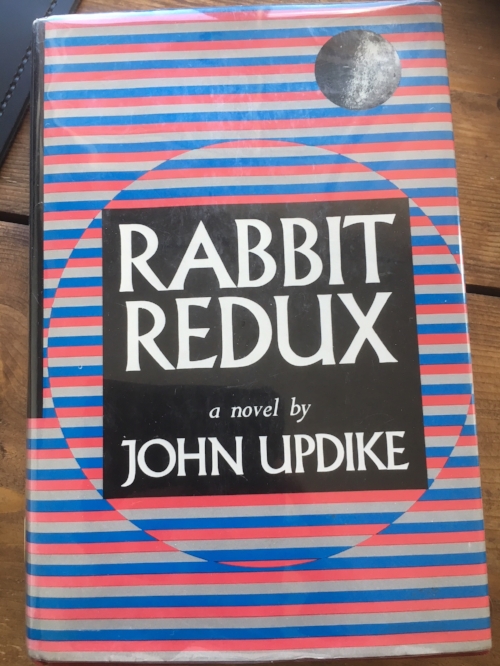My copy... A first edition from a bookstore in Georgia!
Rabbit Redux by John Updike
Updike never met a metaphor he didn’t like. Or at least Rabbit, his long-running protagonist in a series of social novels, never did.
Anyway, that’s what I thought after I read the first book of Updike's Rabbit anthology, Rabbit, Run. But Updike took eleven years between the first and second novels of the series and his writing changed. He aged into a love of nouns and happenings: “It takes Rabbit back to when he used to sit in the radio-listening armchair back on Jackson Road, its arms darkened with grease spots from the peanut butter cracker sandwiches he used to stack there to listen with.” The first Rabbit novel is all descriptions of scenery and place, insights into the connections between movement and color and time that are the basic stuff of metaphors. This later book, in contrast, is made of the specificity of memory.
Updike’s writing feels like some sort of exhalation. As if the writer himself is just letting breath flow from his fingertips. There’s a plot, to be sure, but Updike lets characters remember and think their way through his scenes. Its refreshing to read and kind of a liberating way to think about writing: who cares if you don’t know what happens next? Just revert to memory and maybe something will come. It’s a lot like thought itself works.
The plot here, as in the first novel, centers around an affair. Where the younger Rabbit was running away from his wife, Janice, after a miscarriage, the older Rabbit watches this same wife leave him for a second-generation Greek immigrant. And where the young Rabbit was largely indifferent to the politics of his moment—except insofar as they were concerned with his own behavior and sexual appetites—the older Rabbit is fully engrossed in America’s place in the world. This is 1969. A man is landing on the moon. Vietnam is in full sway. The Moratorium touches at the edges of the plot. And Rabbit has decided to take sides with the forces of the silent majority. Vietnam is a just war because calling it unjust somehow questions Rabbit’s very idea of himself, of where he is in the world, of what America is. To him, calling Vietnam a mistake is like calling Pittsburgh 'Lake Ontario.' It throws off the whole idea of what the world is and should be. There’s no argument about it. America is right because if it isn’t then nothing else in the world works either.
It's a vision of personal politics that feels relevant right now, when support for the president has far less to do with policy than it does with self identity. I can't speak for the totality of Trump's base of support, but interviews like this one suggest that this presidency, like Vietnam, has little or nothing to do with the facts. It's about deciding what team you are on and then defending that team no matter what.
But Rabbit does something that most of us never will: he lives with the enemy. Janice leaves Rabbit and in the emptiness where she has gone, he allows a young black vet named Skeeter to come in, trailing a Connecticut rich girl who is addicted to the dope he is feeding her. The book takes an odd turn: racial politics and Vietnam and culture and drugs are suddenly in Rabbit’s living room, the political turns personal. Updike makes Rabbit confront the consequences of his beliefs and his place in the world. It’s a weird trope and it works pretty well. Why slip into vast social commentary when you can just make cultural antagonists live with one another? Would that we could make our country do the same.
Next week: Lila, by Marilynne Robinson

